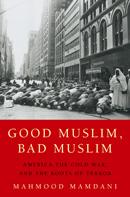Good Muslim, Bad Muslim : America, the Cold War, and the Roots of Terror
Mots-clés :
Bon musulman, Mauvais musulman, Amérique, la guerre froide, Racines de la terreurSynopsis
In a brilliant study of the rise of contemporary political Islam, distinguished political scientist Mahmood Mamdani brings his expertise to bear on a question many Americans have been asking since 9/11: how did this happen?Mahmood Mamdani’s conclusions are as incontrovertible as they are highly provocative. He dispels the idea of “good” (secular, westernized) Muslims, and “bad” (primitive, fanatical) Muslims, underlining the fact that Islam is not a politically based religion. Focusing on the reasons Islam has become politicized, Mamdani shows how the American government’s indirect, post–Vietnam-era sponsorship of terrorist leaders in Indochina and Africa began as a way of dealing with the perceived threat of spreading Soviet influence in these regions. He reminds us how President Reagan openly supported the contras in Nicaragua—calling them the “moral equivalents” of the Founding Fathers—and eagerly embraced the mujahideen of Afghanistan. He explains how America’s rigidly supportive policies toward Israel have fuelled the problems in the Middle East. Finally, he makes clear how the West’s distorted political analysis of Islam and its activities continue to dangerously skew its response to them. Here is a book that will profoundly change our understanding of both Islam and America’s position in the world today.
Téléchargements






